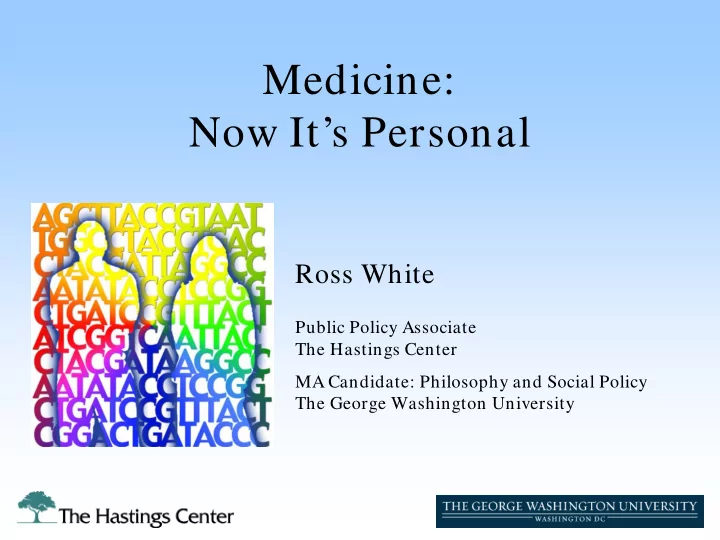

Medicine: Now It’s Personal Ross White Public Policy Associate The Hastings Center MA Candidate: Philosophy and Social Policy The George Washington University
The Promises of Personalized Medicine
Direct-to-Consumer Genetic Testing
Patient-Driven Research
Legislation and Federal Efforts National Center for Advancing Translation Sciences (NCATS) at National Institutes of Health (NIH) – Established by NIH in 2012 – “catalyze the generation of innovative methods and technologies that will enhance the development, testing and implementation of diagnostics and therapeutics across a wide range of human diseases and conditions.” H.R. 3497: MODDERN Cures Act of 2011 – Helps to speed access to and delivery of novel tests and treatments FDA User Fee Act – Creates expedited approval process for “breakthrough therapies” developed using biomarkers
Guiding Questions What reforms are needed for direct-to-c0nsumer genetic tests? How do we better ensure the protection & privacy of genetic data and other personal health information obtained from research and clinical practice? Do we need stronger regulations to prevent discrimination or stigmatization? How can we ensure effective public education about promises & limitations of personalized medicine?
Inconsistent Results, Inaccurate Claims GAO 2010 Report: Direct-To-Consum er Genetic Tests – Purchased tests from 4 companies; compared results for 15 common diseases; 5 undercover customers – One 48 year old male: below-average, average, and above-average risk for prostate cancer and hypertension – 10 egregious examples of deceptive marketing, including using DNA to create personalized supplement to cure diseases
Just Say No to DTC Testing EASAC and FEAM report – “ all kinds of genetic testing require an appropriate and relevant level of professional advice. On the w hole, DTC GT has little clinical value at present and, on occasion, has potential to be harm ful. We w ould not w ish to encourage EU citizens to use DTC GT at present.”
Further Issues for the Public Genetic determinism Personal information vs family information Autonomy vs. knowledge Behavior change? Electronic health records – collection and sharing of health data – Privacy Discrimination and stigmatization – Limits of GINA
Public Understanding 2010 study in Public Health Genom ics – Majority never heard of “genomic medicine” and unfamiliar with “personalized medicine” – Expressed concerns about lack of affordability; unanticipated physical harm; mistrust of the government & researchers; playing God/ disturbing the natural order; lack of regulations; privacy; discrimination; and moral dilemmas about genetic engineering – Unsure about whether they would change health behaviors with more information – Expressed strong interest in learning more about genetic testing and personalized medicine Hah, et al. “A Community's Awareness and Perceptions of Genomic Medicine.” Public Health Genomics. 2010; 13(2):63-71.
Cracking Your Genetic Code
Key Focus Group Findings • Fam iliarity: “Cracking Your Genetic Code” significantly increased fam iliarity w ith biotechnology and bioethics. After view ing the program , tw o-thirds of the general population sam ple and three- fourths of the PBS view er sam ple w ere fam iliar w ith biotechnology and bioethics. Furtherm ore, view ing closed the gap in fam iliarity betw een bioethics and biotechnology. Prior to view ing, fam iliarity w ith biotechnology w as significantly higher than that for bioethics. • Attitudes tow ards having and raising children: There w as a significant increase am ong the general population and PBS view ers on one item —that people should only be allow ed to use genetics to select traits in em bryos that prevent life-threatening conditions. • Attitudes tow ards living as an adult: Several significant increases in agreem ent on privacy issues, such as genetic testing is personal, not a fam ily decision; genetic test results should be confidential; and the concern that em ployers and insurance com panies could m ake decisions based on genetic test results. • Attitudes tow ards end of life decisions: No significant changes across both sam ples. The general population decreased on w anting to know if they had Alzheim er’s and the PBS view ers increased on not w anting to burden fam ily about risk of deadly disease, and on the notion that know ledge of future health reduces current quality of life. 14
Recommendations Increase regulation and oversight of DTC genetic tests by FDA to require medical consultation for all tests and improve effectiveness and clinical utility studies to reduce discrepancies. Create new protections for genetic information to ensure that patients are informed every time that their health data is shared with a third party, including other clinicians. Expand public education efforts around genetic information to dispel misconceptions (including genetic determinism) and better inform them about the complexities of interpreting and understanding genetic information.
Recommend
More recommend